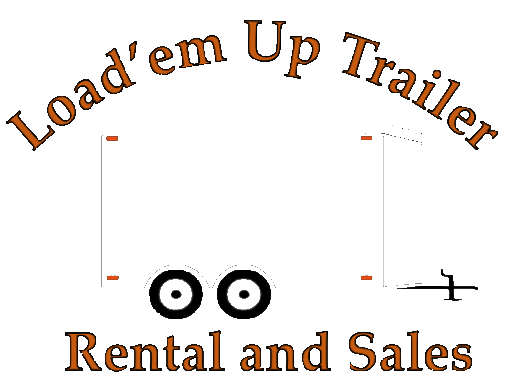When it comes to towing, not all tires are created equal. Using the wrong type of tire on your trailer can lead to poor performance, reduced safety, and costly damage. To ensure a smooth and secure ride, it’s essential to understand factors like load capacity, tire pressure, and tread design.
Before your next hauling trip, take a moment to ensure your trailer is equipped with the right tires for stability, longevity, and fuel efficiency. Whether you're towing heavy equipment, livestock, or recreational vehicles, choosing the right tire makes all the difference.
At Load’em Up Trailers, we’re here to help! Our experts can answer your questions and equip your trailer with the best tires for your needs. Stop by or call us today for expert advice and service.
Trailer Tire Education
Trailer tires are specifically designed for towing and are labeled "ST" (Special Trailer). Unlike car tires, which prioritize traction and comfort, trailer tires have stiff sidewalls to reduce sway and handle heavy loads.
Key Differences Between Trailer Tires and Car Tires
| Feature | Car Tires | Trailer Tires |
|---|---|---|
| Sidewall Flexibility | Soft for traction & comfort | Stiff to minimize sway |
| Tread Depth | Deep for grip & maneuverability | Shallow for stability |
| Air Pressure (PSI) | Lower for everyday driving | Higher to support heavy loads |
| Speed Rating | Up to 175 mph | Typically maxes out at 65 mph |
| Load Capacity | Lower, not designed for towing | Higher, built for hauling heavy loads |
Using car tires on a trailer can lead to instability, blowouts, and a shorter lifespan, while using trailer tires on a car can result in poor braking performance and unsafe driving conditions.
Types of Trailer Tires: Bias Ply vs. Radial Ply
There are two main types of trailer tires, each suited for different needs:
Bias Ply Tires
◦ Built with crisscrossing plies at 30- to 45-degree angles
◦ Best for rough terrain and heavy-duty loads
◦ Less flexible, leading to a rougher ride and shorter tread life
Radial Ply Tires
◦ Constructed with steel belts at a 90-degree angle
◦ Offer a smoother ride, longer tread life, and better heat resistance
◦ Ideal for highway towing
For long-distance towing, radial ply tires are recommended, while bias ply tires are better for off-road or heavy-duty applications.
Understanding Trailer Tire Markings
Trailer tires have markings on their sidewalls that provide essential information. For example, in
ST215/75R15:
◦ ST = Special Trailer
◦ 215 = Tire width in millimeter
◦ 75 = Aspect ratio (height vs. width)
◦ R = Radial construction
◦ 15 = Wheel diameter in inches
Additional markings include:
◦ Max Load Capacity – Indicates the maximum weight a tire can support
◦ PSI Rating – Proper inflation ensures load support and prevents blowouts
◦ Manufacturing Date – Found near the “DOT” stamp in WWYY format (e.g., "0120" means the 1st week of 2020)
◦ Speed Rating – Typically L (75 mph) or M (81 mph)
Trailer Tire Maintenance & Safety Tips
Proper trailer tire maintenance extends lifespan and ensures safe towing. Follow these essential tips:
- ✔️ Check Tire Pressure Regularly – Maintain recommended PSI to prevent uneven wear
- ✔️ Inspect for Tread Wear – Overinflation causes center tread wear, underinflation wears the outer edges
- ✔️ Monitor Tire Age – Replace trailer tires every 4–5 years, even if tread looks good
- ✔️ Protect Against UV Damage – Use tire covers to prevent rubber degradation
- ✔️ Avoid Overloading – Follow manufacturer load ratings to prevent blowouts
- ✔️ Rotate Tires – Evenly distributes wear, extending lifespan
- ✔️ Store Tires Properly – Elevate trailer when stored to reduce flat spots
What Trailer Tires Hold the Most Weight?
If you're hauling heavy loads, E-rated tires (Load Range E) are the best option. These tires have a 10-ply rating, operate at 80 PSI, and can support between 2,900 and 3,400 lbs per tire.
How Many Ply Should Your Trailer Tires Be?
The number of plies (layers of rubber and fabric) determines tire strength. Here’s a quick guide:
| Load Range | Ply Rating | Max PSI |
|---|---|---|
| Standard Load (SL) | 4-ply | 36 PSI |
| Extra Load (XL) | 4-ply | 42 PSI |
| C1 Load Range | 6-ply | 50 PSI |
| D1 Load Range | 8-ply | 65 PSI |
| E1 Load Range | 10-ply | 80 PSI |
| F1 Load Range | 12-ply | 95 PSI |
| G1 Load Range | 14-ply | 110 PSI |
For heavy-duty trailers, choosing higher ply ratings reduces blowout risks and improves towing safety.
Can You Use Trailer Tires on a Car?
🚫 No! Trailer tires should never be used on a car. They lack the necessary traction, flexibility, and braking performance for safe driving. Their stiff sidewalls make them unsafe for everyday maneuvering.
Final Thoughts: Choosing the Right Trailer Tires for Safe Towing
When towing a trailer, using the correct trailer tires is essential for safety and performance. Trailer tires are built for load-bearing and stability, while car tires focus on grip and maneuverability. Choosing the right type, properly maintaining them, and replacing them on time can prevent accidents and extend their lifespan.
At Load’em Up Trailers, we’re here to help! Whether you need new trailer tires, maintenance tips, or expert advice, our team has you covered.
📞 Call us today or visit Loademuptrailer.com for all your trailer tire needs!

